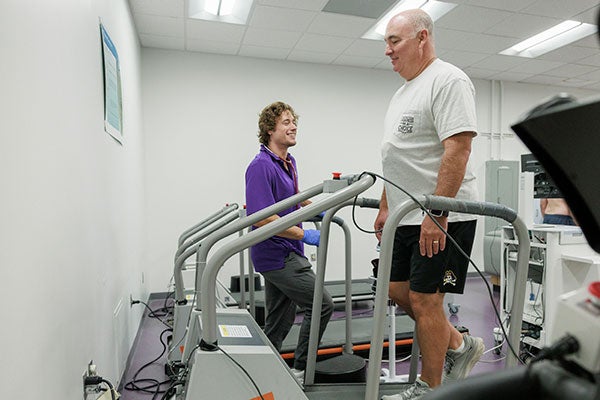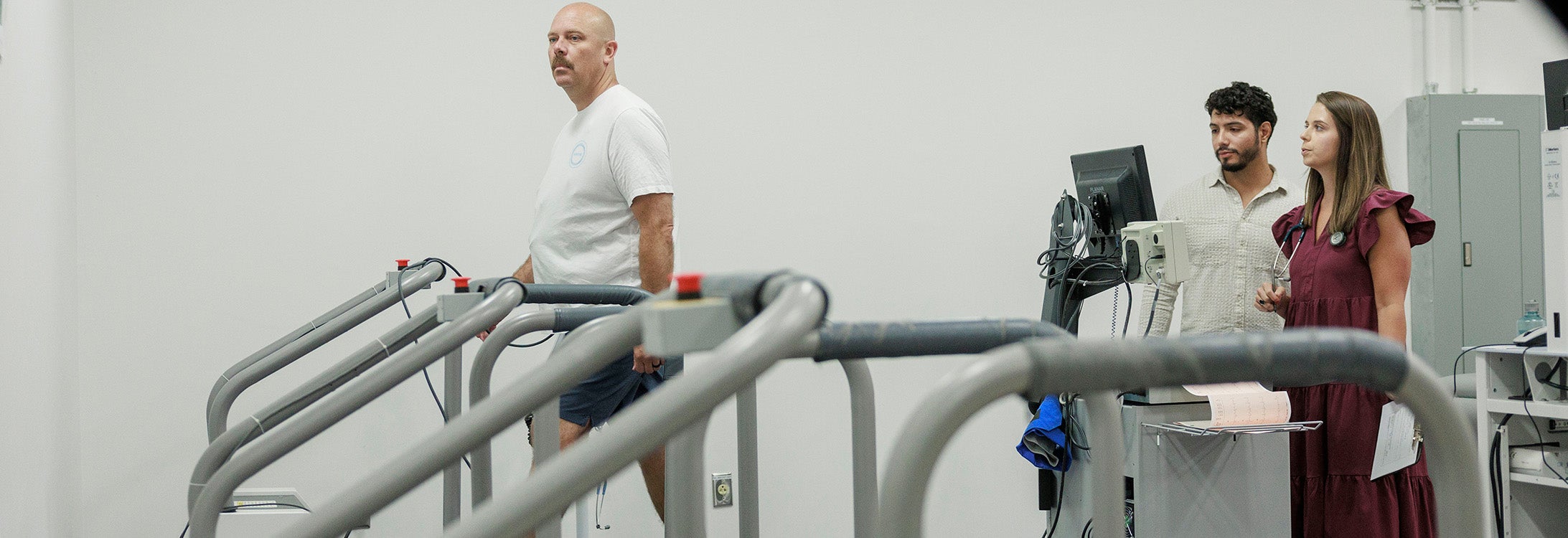Tech-laden assessment program preps first responders
Brandon Locklear, a captain with City of Greenville Fire/Rescue, has benefited for decades from the East Carolina University cardiovascular health assessment program.

Brandon Locklear, right, with Greenville Fire/Rescue, shares a laugh with ECU master’s graduate assistantship student Ethan Clark while participating in a stress test at the Human Performance Lab.
Locklear can recall when earlier versions measured body fat using water displacement, but that has long been replaced by advancements that have propelled the Human Performance Lab to thoroughly assess the physical health of first responders. The main component for assessment is the electrocardiogram stress test, along with vision and pulmonary function testing and the DEXA scan, which uses low-dose X-rays for bone density and body composition assessment.
Immediate results and body analysis are made available to community partners, which includes ECU Police and Greenville and Washington first responders, in addition to other eastern North Carolina representatives including from Edgecombe County. Program coordinator Allison Bartlett, representing the College of Health and Human Performance, said some people drive two hours to the lab to participate in testing.
“With DEXA as an example, the fact that you can lay there for three minutes and get your fat mass, muscle mass and bone density all right then and that accurate, it’s really neat,” said Ethan Clark, one of the HHP graduate assistantship master’s students who guides HPL visitors from station to station while recoding data. “I like how people are always motivated when they get the results.”
The tests, which are available to community members, provide participants with a valuable and sometimes annual snapshot of their health, Locklear said. The program has been used by first responders for hiring and body maintenance purposes.
“We prepare for a lifetime of what may be a stressful environment,” Locklear said. “Coming here can make sure that you are physically prepared for whatever the job is in front of you, whether that is fighting fires or EMS calls or just the normal stress of the profession. It is not a pleasant feeling when you’re getting to the end of the stress exercise test, however, the reward on the back side is you see where you are at and what your body can do. The departments and ECU allowing us to come over and do that, it’s a good partnership.”
A big reward is receiving results in mere minutes and discussing those results with a local doctor. One of those doctors, Jonathon Firnhaber with the Brody School of Medicine Department of Family Medicine, is appreciative of the interactions.
“It is nice, in a small way, to be able to say thanks to some of the people who have difficult jobs,” he said.
Doctors are there for analysis, reinforcement and to make recommendations. They often are the last person to talk to the participant before they exit the lab in the Ward Sports Medicine Building.
Overall, it is a fast-paced environment with a goal to benefit everyone involved.
“Especially if there is an abnormality or they are disappointed with their performance, you can give immediate feedback,” Firnhaber said.
Bartlett has a special connection to the cardiovascular health assessment program. After earning her bachelor’s degree in exercise and sports science at Meredith College, she came to ECU to assist in research while earning her Master of Science in exercise physiology. She was elevated to coordinator of the cardiovascular health assessment program in July of 2021, just a few months after earning her master’s degree, and is a teaching instructor in the Department of Kinesiology.
Her career path has allowed her to reflect on her progression since arriving at ECU as a graduate research assistant five years ago.
“I have always felt it is an honor to have experienced the program from the student side, with running the assessments, to now coordinating all of the admin and behind-the-scenes aspects of the program,” she said. “It was a fun transition to go from student to coordinator so quickly, but my experiences in the master’s program were extremely helpful in adjusting quickly to my coordinator role here. I also really enjoy working with the students and seeing them gain the same experience and skills that I did in the program, as I know how beneficial the HPL’s testing program was to the development of not only my skills as an exercise physiologist, but also as a professional.”
Bartlett’s insight is rooted in the importance of experiential learning to the student experience.
“This program is such an important service to these police and fire/rescue departments, but also our students,” Bartlett said. “They are able to interact with the first responders and our various physicians and develop skills they are learning about in many of their classes. Those skills will benefit them in future careers in our field.”
